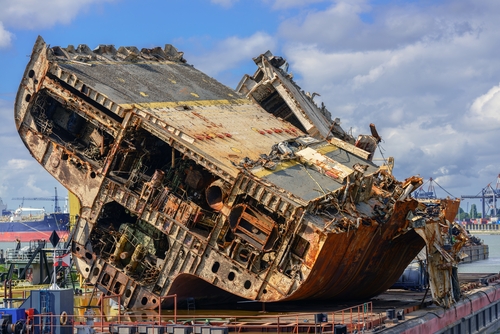According to GMS’ latest weekly ship-recycling report, the signs of the times become increasingly clear and the future -both for the ship recycling community and the world at large- seems ominous.
As the effects of Donald Trump’s shock victory continue to have far-reaching consequences, the U.S. economy strengthens under President Biden with the news that the country is opening up offshore drilling to further reduce American dependence on foreign oil. This, along with China’s waning demand, has caused crude oil to suffer this week, with the barrel falling further to $67, booking a 5% drop by Friday.
As President Biden also greenlights Ukraine to use long-range U.S.-made missiles in Russia, unfolding a wider possibility of war, in a weird twist of events and amidst American and Israeli forces hammering Houthi strongholds and arms depots across Yemen, the Baltic Dry Index surprisingly surged 293 points to 3,229 this week.
Meanwhile, as the destruction of Iran’s arms facilities continues to come to light, the IDF’s demolition of secret Iranian nuclear facilities previously unknown to the world has ignited a fire in the Iranian establishment for revenge. As Israel continues decimating Hezbollah leaders and strongholds across Southern Lebanon, the IDF also avenged a senior Hezbollah commander responsible for striking Netanyahu’s residence with a missile, killing the commander in an airstrike.
As the signs of the times become increasingly clear and a war-ready Trump prepares to take office, the future—both for the ship recycling community and the world at large—seems ominous. Economically, there are concerns Trump could be tough on China, and proposed tariffs on Chinese imports (electric vehicles and steel in particular) could lead to increased dumping of material into subcontinent locations—something both Pakistan and India have been struggling with this year.
In the interim, as the U.S. economy continues to strengthen and the U.S. dollar firms against nearly all recycling destination currencies (including China, where Chinese stocks recorded rallies this week), local steel plate falls from China saw various destination steel levels reciprocate with declines of their own this week. Yet, deliveries of dry units continued at pace across Indian and Bangladeshi waterfronts over recent weeks of the declining BDA, including this one.
Although supply has primarily been from the vintage container and dry bulk sectors, activity seems to have picked up as the industry heads towards the end of 2024, following one of the most barren years for ship recycling volumes in over a decade. As Bangladesh remains burdened by political instability and inflation, the Chattogram market has slowed beyond all recognition for large parts of the year, leaving local buyers to cherry-pick cheaper, geographically positioned units.
Pakistan continues to scramble for more IMF funding to stabilize its economy, as buyers there have remained silent, with only laughable offers coming forth of late. Finally, Turkey remains entrenched in its declining lira, with both import and local steel recording USD 10/ton declines across the week, leaving Aliaga levels down by USD 10/MT.
Overall, as various shipping events unfolded across the world, most notably the annual Tradewinds Ship Recycling conference in Copenhagen and Bahri week in Dubai, markets remained on a fairly even footing for the week, with little movement or activity to report. Industry players remained busy with meetings, and sentiments finally seem to be on an even keel, as a healthy collection of sales continue to be confirmed to buyers with ready finances and empty yards.
For Week 46 of 2024, GMS Market Rankings / vessel indications are as below:
| Rank | Location | Sentiment | Dry Bulk (USD / LDT) | Tankers (USD / LDT) | Containers (USD / LDT) |
|---|---|---|---|---|---|
| 1 | Bangladesh | Stable | 470 / LDT | 490 / LDT | 500 / LDT |
| 2 | India | Stable | 460 / LDT | 480 / LDT | 490 / LDT |
| 3 | Pakistan | Stable | 450 / LDT | 470 / LDT | 480 / LDT |
| 4 | Turkey | Down | 320 / LDT | 330 / LDT | 340 / LDT |

































































